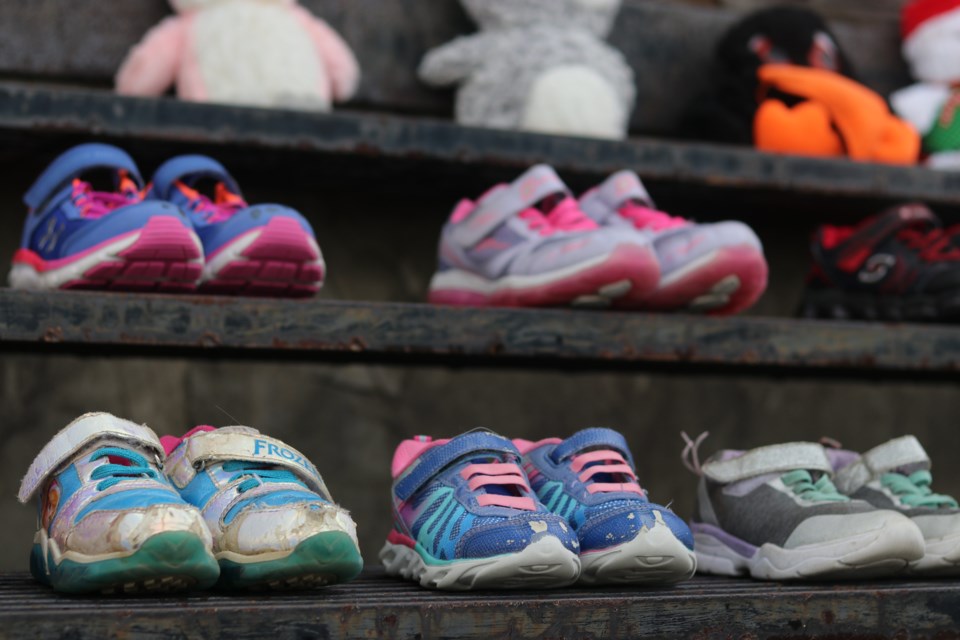TIMMINS - Eleven-year-old Adriana Tavares says when they first learned about residential schools, it made them feel very mad and sad.
In the wake of the recent discovery of the remains of 215 children at a former residential school in Kamloops, B.C., St. Joseph School’s Grade 5/6 teacher Megan Beyer-Mascioli brought the topic up during her Monday class.
Tavares, who uses the pronouns they/their, is a student at St. Joseph School.
Tavares' grandmother is from Nisichawayasihk Cree Nation in Nelson House, Manitoba, and was taken to a residential school in the Hudson Bay region.
Their grandmother prefers not to talk about residential schools but she once talked about her hair and how she wasn’t allowed to keep it long. Now, she prefers not to cut it because it’s an important aspect of the Indigenous culture.
Tavares learned about residential schools when they were in Grade 2 or 3. They said it’s scary to think the last residential school closed only 25 years ago.
“If Canada didn’t recognize their mistakes and what they’re doing to our culture, me and my siblings could have very, very well ended up in one. My mom could’ve ended up in one, too,” Tavares said.
Beyer-Mascioli said the students were familiar with the history of residential schools before the discovery of the mass grave.
This week, she talked to her class about the residential schools, how many were in Canada and where they were located, when the last school closed, where the closest school was to Timmins, and about the Truth and Reconciliation Commission. They also looked at the Indian Residential School Survivors Society (IRSSS).
The class started with an Indigenous Oh Canada and instead of saying a Catholic prayer that day, they said a healing prayer. All week long, the students have been saying an Indigenous healing prayer, keeping the Kamloops children and affected families in mind.
The students didn’t have too many questions about residential schools, Beyer-Mascioli said stressing the importance of keeping the conversation going on all year-round.
Knowing there were some students who identify as Indigenous who have been impacted by residential schools, Beyer-Mascioli also posted the IRSSS crisis line number for the students to have access to.
When Beyer-Mascioli asked the students what they can do to continue the conversation and help the local Indigenous population that was impacted by intergenerational trauma, Tavares came up with an idea for students to put their shoes at their doors and take photos.
“I realized that it was important to recognize how it affected the families. Their families didn’t know that they (the children) basically died there and I realized that we should do something to help remember those children, that we can’t even get names today,” they said, noting it’s important for people to recognize what Canada did to the Indigenous culture.
When preparing to discuss residential schools with children, it’s crucial to use age-appropriate language, Beyer-Mascioli said. She never brought up the sexual abuse with her students.
There are many age-appropriate books about residential schools for kids such as When I was Eight, Stolen Words, Not My Girl, I am Not a Number, Phyllis’s Orange Shirt and As Long as the Rivers Flow. There are also YouTube videos where some of these books are read aloud.
The Moosonee-based Child and Youth Milopemahtesewin Services (CYSM) prevention team has shared some tips on how to talk to your children about residential schools.
-
Take time to prepare yourself emotionally, rehearse how you want to share this information with your children, set the tone with the environment by turning off TV and phones or gathering children around the kitchen table.
-
Use age-appropriate information and language. Reading books is helpful for young children.
-
Allow time and space for questions. If you don’t know the answers, try to research and learn together. Let your child know that you will be available to answer any questions as they come up.
-
Check in and ask how your child is feeling. Acknowledge and normalize their feelings. You may share your feelings too.
-
Talk about the healthy activities your children can do to express their feelings such as crying, praying, hugging, dancing, going for a walk, doing art, wearing an orange T-shirt or placing shoes outside their doors.
Timmins Native Friendship Centre worker Caitlyn Kaltwasser, who’s the granddaughter of a residential school survivor, said she’s held age-appropriate conversations with her son.
“So we talked about it. And we cried. He had some questions that I wasn’t prepared for but I did my best to answer. Some of his questions were things I didn’t understand either,” she said. “After our talk, I asked my son to help me put out a teddy and an orange shirt on our front step to honour the children.”
She said she believes for healing to truly begin, these stories need to be shared, understood and recognized by Canadians but it should be done in an age-appropriate and trauma-informed way. Adults should be open to the questions children have and be mindful of the feelings that may arise.
“I think that speaking about the abuses that occurred in these schools is a part of the story that may not be understood fully at a younger age, but there are many resources and tools out there that speak to very fundamental parts of Indigenous culture, school and community and can introduce the opportunity to learn,” she said. “When our children are exposed to these kinds of stories or information, it brings an opportunity for open discussion.”
The 24-hour national residential school crisis line, established to provide support to former students and their families, can be accessed at 1-866-925-4419.
